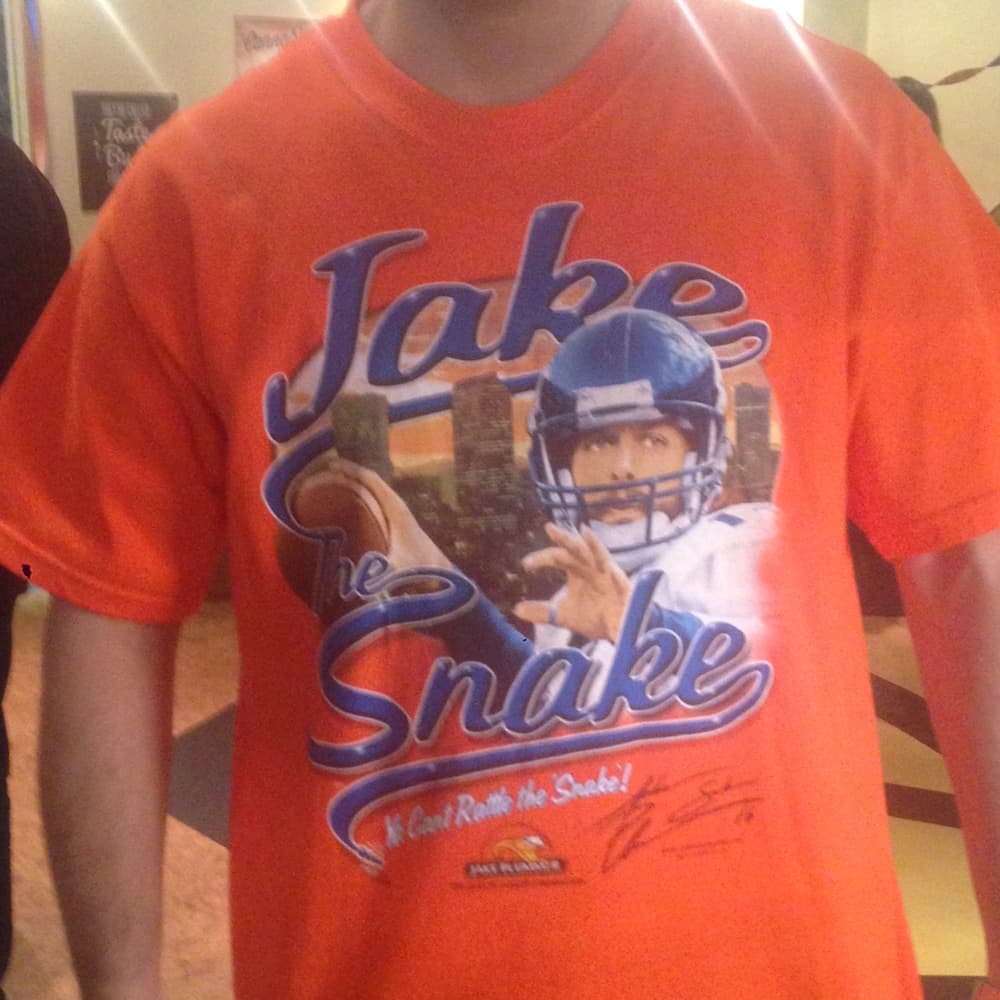
Sports podcasts are about as ubiquitous as political #takes on your Facebook feed these days. A cursory search reveals that there are more than 230 available on iTunes alone. There are dozens and dozens of podcasts devoted to America’s most popular leagues, the NFL and NBA, and even those that cover more obscure ones like ultra-marathon running, Mixed Martial Arts and fantasy sports, which as the word fantasy implies, isn’t even a sport.
There are a lot of sports podcasts. But as one of the patrons at The Honey Cellar in Boulder asked Saturday, “This has to be the first sports podcast hosted in the basement of a dispensary, right?”
Former Denver Broncos quarterback Jake Plummer spent the afternoon at The Honey Cellar, a dispensary that opened in July. He was there meeting fans, signing autographs and recording an episode of his weekly podcast, Snake’s Takes.
On Saturday's agenda? Discussing the use of cannabis products and how they represent a safe alternative to opioids like Vicodin and Percocet for athletes — and every-day people in general — when it comes to coping with pain.
Plummer became an advocate for cannabis products after he underwent surgery in 2012 to reattach the labrums in both hips, injuries he accrued over a 10-year NFL career. The surgeries left him immobile and in pain. He was prescribed Vicodin to help him cope, but Plummer didn’t even go through a third of his prescription. His mother taught him as a child how addictive opioids could be, and that lesson was only reinforced when he saw NFL teammates go to rehab over opioid addictions when their playing careers were over.
Plummer moved to Colorado and got a medical marijuana card, thinking that perhaps smoking would help. It did, marginally, but Plummer's hips still experienced pain when the weather changed or winter arrived.
Then a former teammate told Plummer about Charlotte’s Web, a hemp extract high in cannabidiol that's designed to offer pain relief and doesn’t get you high. Plummer swears by it.
“I was in pain a lot,” he said. “And I didn’t really realize it until that pain went away. I don’t want to say the pain was debilitating, but it would come and go, whether I was active or not. It’s just part of taking care of your body. That was the first step that allowed me to really start taking care of my body because I could move freely without days of pain in my joints. Winter didn’t beat me up as bad last year. And I don’t have the headaches I used to have randomly. I wouldn’t be talking about it if it didn’t help me.”

On Saturday, Plummer and Justin Lee, the owner and founder of The Honey Cellar, discussed their experiences using cannabis products as a way to deal with pain. Lee began exploring cannabis’ pain-dulling effects while competing as a mixed martial artist on the International Brazilian Jiu-Jitsu Federation circuit. Indica, which gives users more of a body high than head high, helped Lee sleep at night.
Lee knew he wanted to avoid opioids after witnessing one of his older brothers, a rugby player and wrestler, get hooked on them following back surgery. The drugs forced his older brother into rehab, and while he came out OK, it still left an impression.
“It was really, really tough to deal with,” Lee, 36, said. “He’s got a heart of gold. You know, he’s still that same person. But it’s a really addictive substance, and when you’re on it for pain, it’s really difficult to get off. It’s heroine. It’s legalized heroine.
You have to go to rehab. It’s expensive. It’s sad. It can tear a family up. I’ve never seen marijuana do anything remotely close to affect a family like that.”
Cannabis use is still illegal in most sports. It remains on the NFL’s banned substance list. The tide might be slowly turning, though.
The NFL Player’s Association recently formed a committee that includes medical officials and active and former players to study the chronic pain football players feel. One thing they’ll look at is cannabis’ potential as a pain reliever.
The majority of NFL players seem to feel that taking cannabis off the banned substance list would reduce the amount of opioids player take. ESPN anonymously polled 226 players, and 61 percent of them said they felt this would be the case.
To Plummer, this marks progress, even if it is occurring slowly.
“Of course it is,” he said. “It’s now a topic that’s out. There must be concern. Someone’s saying, ‘Hey, we need to do this.’ It’s coming up in conversation. There’s a whole group of guys who are fighting for this to at least explore something that could be preventative.
"These are remedies that need to be explored. Hopefully, we’ll just keep trying to tell people.”
Subscribe to Denverite's weekly sports newsletter here.











